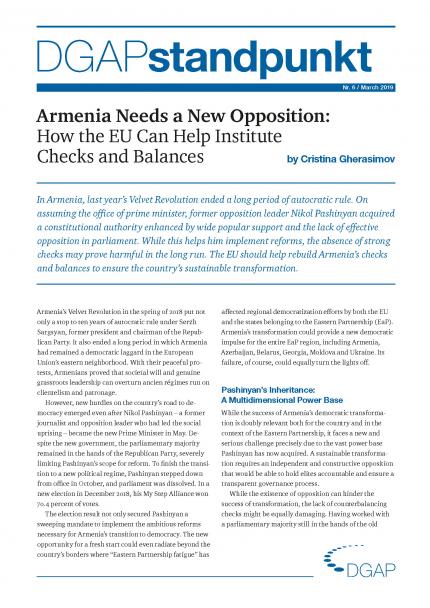Armenia’s Velvet Revolution in the spring of 2018 put not only a stop to ten years of autocratic rule under Serzh Sargsyan, former president and chairman of the Republican Party. It also ended a long period in which Armenia had remained a democratic laggard in the European Union’s eastern neighborhood. With their peaceful protests, Armenians proved that societal will and genuine grassroots leadership can overturn ancien régimes run on clientelism and patronage.
However, new hurdles on the country’s road to democracy emerged even after Nikol Pashinyan – a former journalist and opposition leader who had led the social uprising – became the new Prime minister in May. Despite the new government, the parliamentary majority remained in the hands of the Republican Party, severely limiting Pashinyan’s scope for reform. To finish the transition to a new political regime, Pashinyan stepped down from office in October, and parliament was dissolved. In a new election in December 2018, his My Step Alliance won 70.4 percent of votes.
The election result not only secured Pashinyan a sweeping mandate to implement the ambitious reforms necessary for Armenia’s transition to democracy. The new opportunity for a fresh start could even radiate beyond the country’s borders where “Eastern Partnership fatigue” has affected regional democratization efforts by both the EU and the states belonging to the Eastern Partnership (EaP). Armenia’s transformation could provide a new democratic impulse for the entire EaP region, including Armenia, Azerbaijan, Belarus, Georgia, Moldova and Ukraine. Its failure, of course, could equally turn the lights off.
Pashinyan’s Inheritance: A Multidimensional Power Base
While the success of Armenia’s democratic transformation is doubly relevant both for the country and in the context of the Eastern Partnership, it faces a new and serious challenge precisely due to the vast power base Pashinyan has now acquired. A sustainable transformation requires an independent and constructive opposition that would be able to hold elites accountable and ensure a transparent governance process.
While the existence of opposition can hinder the success of transformation, the lack of counterbalancing checks might be equally damaging. Having worked with a parliamentary majority still in the hands of the old regime during his first term as prime minister, Pashinyan’s limited actions caused discontent. He was unable to deliver the reforms he envisaged, such as the failure to amend the Electoral Code.
This situation changed after the December election. Pashinyan’s new government now faces no opposition – either parliamentary, non-parliamentary, or even societal. Not only does his parliament faction have an absolute majority, but the prime minister’s course of reform has also been endorsed by the only other two political parties represented in parliament, Prosperous Armenia and Bright Armenia.
This means that a functional political oversight is now missing despite a government committed to democratic reform. The set-up paradoxically echoes previous scenarios: While the Armenian constitution guarantees the opposition 30 percent of the seats in the National Assembly, past legislatures, dominated by the Republican Party, used to be filled with de facto loyalists.
Edmon Marukyan, chairman of the Bright Armenia Party which won 18 seats in the December elections, has announced that his party will formally serve as opposition to the Pashinyan government. While this is a good start, it is no secret that Marukyan’s party also supports the prime minister’s reform agenda. Although the party could become a genuine opposition force in the long run, it is yet too early to judge the party’s oversight capacity at this stage.
Neither can the party of former president Serzh Sargsyan, the Republican Party, act as a constitutional counterbalance: It failed to clear the 5 percent threshold to enter parliament by winning only 4.7 percent of the votes. While a revival of the ancien régime and old-style politics is certainly possible, the Velvet Revolution has reiterated the demand for new politics. The party would therefore have to reform and adopt democratic principles of good governance to increase Armenia’s prospects of sustainable political pluralism. It is yet to be seen what kind and degree of opposition it will exert now that it is left out of the political process and also increasingly vulnerable due to the planned anti-corruption reforms.
Armenia’s latest elections have also depleted the ranks of societal opposition as former influential opinion leaders of the public sphere have been catapulted into politics. Numerous civil society activists and journalists are now filling governmental positions and have become protagonists in the process of defining and implementing Armenia’s transformation agenda. As a result, civil society has been severely drained in its capacity to hold the new elites accountable.
Finally, Pashinyan’s powers as prime minister have no legal counterbalance. Former president Sargsyan had passed several constitutional amendments in 2015 which empowered the office with an overly strong mandate at the expense of the presidency and the government. For instance, all law enforcement agencies were made directly responsible to the prime minister. His intention, according to local experts, had been to secure a new political role for himself as he was approaching the end of his second term as president – two terms are the maximum according to the Armenian constitution.
This transfer of powers had been harshly criticized by the opposition forces at the time. Pashinyan himself, then still a political activist, had called it the “system of the prime minister’s dictatorship”. Today, as a result of the Velvet Revolution, it is he who wields these extensive powers.
The Current Dilemma: Democratization without Opposition
Pashinyan, in summary, holds a multidimensional authority: The lack of parliamentary opposition is augmented by the increased constitutional powers introduced for the office of prime minister under his predecessor, and the absence of opposition forces in the public sphere.
The impact of such a largely opposition-free scenario on the odds of reform is critical: Without robust oversight, unrestrained power may eventually corrupt even the most genuine reformists. Examples abound of abuses of power by or on behalf of icons of democracy who came to power on anti-corruption ballots: In Georgia, after the 2003 Rose Revolution, Mikheil Saakashvili was elected president with 96 percent of the popular vote while his opponents received less than two percent each. In 2004, Saakashvili’s legitimacy was strengthened even more when the National Movement-Democrats, the faction supporting Saakashvili, won the parliamentary election with 67 percent of the votes.
While Saakashvili’s legacy of modernizing Georgia is uncontestable, his second term in particular was marred by numerous abuses of power. According to international monitoring groups, he did little to stop the rise of a new kleptocratic business elite linked to his political party. The most recent presidential election campaign showed how far Georgia still has to go to strengthen its democratic political culture. It therefore remains to be seen how sustainable the democratization process initiated by Saakashvili will remain. Georgia’s example highlights a problem that Armenia might well face, too, given its new, one-sided distribution of political power.
The EU’s Role: Reviving Oversight in Close Dialogue with Armenia
At the same time, the success of Armenia’s current reform process could have effects far beyond its own borders. As a result, the European Union is a crucial stakeholder in the future development of Armenia and its neighbors in the Eastern Partnership. Like other EaP states, Armenia finds itself within a fragile context of competing geopolitical interests. This is, for instance, exemplified by its long-standing economic and security ties with resurgent Russia as well as the intrinsic vulnerabilities Armenia suffers as a result of the Nagorno-Karabakh conflict.
In view of these factors, European partners have an important role: By helping rebuild a new democratic opposition in Armenia, they can enhance the sustainability of the reform process. This would help Pashinyan not only maintain high national support for his reform agenda, but also counter potential harmful narratives about selective justice or retribution against the ancien régime. Given the region’s fragile situation, any EU efforts in assisting the country’s transformation will also have to continue under careful guidance by the Armenian government.
The strengthening of institutions and good governance are already key areas of cooperation, according to the EU-Armenia Partnership Priorities 2017-2020. Within this framework, the EU could contribute to the revival of oversight in a few major ways. One way would be to assist Pashinyan’s government in counterbalancing the powers of the prime minister. The EU could provide advice and expertise on the process of designing viable institutional checks that fit the idiosyncrasies of the Armenian political context. This would facilitate a sustainable balance of powers regardless of who holds the office of prime minister.
The EU could also help Armenian authorities build a robust foundation for the renewal and consolidation of civil society. Such actions could include inviting civil society representatives to participate in the meetings held during EU monitoring visits to Armenia. Brussels could also contribute to ensuring that relevant NGOs and think tanks are permanently involved in a public consultation process on the reform agenda and general policy planning. It could advise on the introduction of public funding schemes for civil society initiatives; under such a scheme, taxpayers could, for instance, be offered to contribute a certain percentage of their income tax to specific NGOs or volunteer groups. The EU could also directly support new civil society initiatives, strengthen existing ones through capacity building programs, and educate a new generation of independent journalists through coordinated efforts with organizations such as the European Endowment for Democracy.
Finally, the EU and its member states could encourage the training of future political leaders to serve as checks on government elites regardless of the political parties in power. In partnership with organizations that provide training in the area of political and public administration education, such as the German political foundations, these groups could foster the development of a new political culture of constructive debate and policy planning. Such measures would help consolidate a new democratic opposition which relies on national dialogue and constructive compromise. This would strengthen the democratic checks on power and enhance the sustainability of the transformation that Armenia has boldly embarked on.

